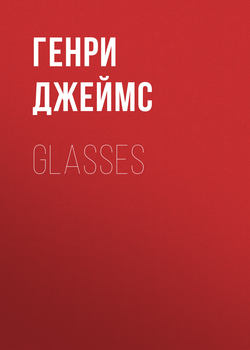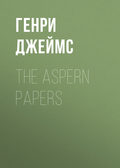CHAPTER I
Yes indeed, I say to myself, pen in hand, I can keep hold of the thread and let it lead me back to the first impression. The little story is all there, I can touch it from point to point; for the thread, as I call it, is a row of coloured beads on a string. None of the beads are missing—at least I think they’re not: that’s exactly what I shall amuse myself with finding out.
I had been all summer working hard in town and then had gone down to Folkestone for a blow. Art was long, I felt, and my holiday short; my mother was settled at Folkestone, and I paid her a visit when I could. I remember how on this occasion, after weeks in my stuffy studio with my nose on my palette, I sniffed up the clean salt air and cooled my eyes with the purple sea. The place was full of lodgings, and the lodgings were at that season full of people, people who had nothing to do but to stare at one another on the great flat down. There were thousands of little chairs and almost as many little Jews; and there was music in an open rotunda, over which the little Jews wagged their big noses. We all strolled to and fro and took pennyworths of rest; the long, level cliff-top, edged in places with its iron rail, might have been the deck of a huge crowded ship. There were old folks in Bath chairs, and there was one dear chair, creeping to its last full stop, by the side of which I always walked. There was in fine weather the coast of France to look at, and there were the usual things to say about it; there was also in every state of the atmosphere our friend Mrs. Meldrum, a subject of remark not less inveterate. The widow of an officer in the Engineers, she had settled, like many members of the martial miscellany, well within sight of the hereditary enemy, who however had left her leisure to form in spite of the difference of their years a close alliance with my mother. She was the heartiest, the keenest, the ugliest of women, the least apologetic, the least morbid in her misfortune. She carried it high aloft with loud sounds and free gestures, made it flutter in the breeze as if it had been the flag of her country. It consisted mainly of a big red face, indescribably out of drawing, from which she glared at you through gold-rimmed aids to vision, optic circles of such diameter and so frequently displaced that some one had vividly spoken of her as flattering her nose against the glass of her spectacles. She was extraordinarily near-sighted, and whatever they did to other objects they magnified immensely the kind eyes behind them. Blest conveniences they were, in their hideous, honest strength—they showed the good lady everything in the world but her own queerness. This element was enhanced by wild braveries of dress, reckless charges of colour and stubborn resistances of cut, wondrous encounters in which the art of the toilet seemed to lay down its life. She had the tread of a grenadier and the voice of an angel.
In the course of a walk with her the day after my arrival I found myself grabbing her arm with sudden and undue familiarity. I had been struck by the beauty of a face that approached us and I was still more affected when I saw the face, at the sight of my companion, open like a window thrown wide. A smile fluttered out of it an brightly as a drapery dropped from a sill—a drapery shaken there in the sun by a young lady flanked by two young men, a wonderful young lady who, as we drew nearer, rushed up to Mrs. Meldrum with arms flourished for an embrace. My immediate impression of her had been that she was dressed in mourning, but during the few moments she stood talking with our friend I made more discoveries. The figure from the neck down was meagre, the stature insignificant, but the desire to please towered high, as well as the air of infallibly knowing how and of never, never missing it. This was a little person whom I would have made a high bid for a good chance to paint. The head, the features, the colour, the whole facial oval and radiance had a wonderful purity; the deep grey eyes—the most agreeable, I thought, that I had ever seen—brushed with a kind of winglike grace every object they encountered. Their possessor was just back from Boulogne, where she had spent a week with dear Mrs. Floyd-Taylor: this accounted for the effusiveness of her reunion with dear Mrs. Meldrum. Her black garments were of the freshest and daintiest; she suggested a pink-and-white wreath at a showy funeral. She confounded us for three minutes with her presence; she was a beauty of the great conscious public responsible order. The young men, her companions, gazed at her and grinned: I could see there were very few moments of the day at which young men, these or others, would not be so occupied. The people who approached took leave of their manners; every one seemed to linger and gape. When she brought her face close to Mrs. Meldrum’s—and she appeared to be always bringing it close to somebody’s—it was a marvel that objects so dissimilar should express the same general identity, the unmistakable character of the English gentlewoman. Mrs. Meldrum sustained the comparison with her usual courage, but I wondered why she didn’t introduce me: I should have had no objection to the bringing of such a face close to mine. However, by the time the young lady moved on with her escort she herself bequeathed me a sense that some such rapprochement might still occur. Was this by reason of the general frequency of encounters at Folkestone, or by reason of a subtle acknowledgment that she contrived to make of the rights, on the part of others, that such beauty as hers created? I was in a position to answer that question after Mrs. Meldrum had answered a few of mine.
CHAPTER II
Flora Saunt, the only daughter of an old soldier, had lost both her parents, her mother within a few months. Mrs. Meldrum had known them, disapproved of them, considerably avoided them: she had watched the girl, off and on, from her early childhood. Flora, just twenty, was extraordinarily alone in the world—so alone that she had no natural chaperon, no one to stay with but a mercenary stranger, Mrs. Hammond Synge, the sister-in-law of one of the young men I had just seen. She had lots of friends, but none of them nice: she kept picking up impossible people. The Floyd-Taylors, with whom she had been at Boulogne, were simply horrid. The Hammond Synges were perhaps not so vulgar, but they had no conscience in their dealings with her.
“She knows what I think of them,” said Mrs. Meldrum, “and indeed she knows what I think of most things.”
“She shares that privilege with most of your friends!” I replied laughing.
“No doubt; but possibly to some of my friends it makes a little difference. That girl doesn’t care a button. She knows best of all what I think of Flora Saunt.”
“And what may your opinion be?”
“Why, that she’s not worth troubling about—an idiot too abysmal.”
“Doesn’t she care for that?”
“Just enough, as you saw, to hug me till I cry out. She’s too pleased with herself for anything else to matter.”
“Surely, my dear friend,” I rejoined, “she has a good deal to be pleased with!”
“So every one tells her, and so you would have told her if I had given you the chance. However, that doesn’t signify either, for her vanity is beyond all making or mending. She believes in herself, and she’s welcome, after all, poor dear, having only herself to look to. I’ve seldom met a young woman more completely free to be silly. She has a clear course—she’ll make a showy finish.”
“Well,” I replied, “as she probably will reduce many persons to the same degraded state, her partaking of it won’t stand out so much.”
“If you mean that the world’s full of twaddlers I quite agree with you!” cried Mrs. Meldrum, trumpeting her laugh half across the Channel.
I had after this to consider a little what she would call my mother’s son, but I didn’t let it prevent me from insisting on her making me acquainted with Flora Saunt; indeed I took the bull by the horns, urging that she had drawn the portrait of a nature which common charity now demanded of her to put into relation with a character really fine. Such a frail creature was just an object of pity. This contention on my part had at first of course been jocular; but strange to say it was quite the ground I found myself taking with regard to our young lady after I had begun to know her. I couldn’t have said what I felt about her except that she was undefended; from the first of my sitting with her there after dinner, under the stars—that was a week at Folkestone of balmy nights and muffled tides and crowded chairs—I became aware both that protection was wholly absent from her life and that she was wholly indifferent to its absence. The odd thing was that she was not appealing: she was abjectly, divinely conceited, absurdly fantastically pleased. Her beauty was as yet all the world to her, a world she had plenty to do to live in. Mrs. Meldrum told me more about her, and there was nothing that, as the centre of a group of giggling, nudging spectators, Flora wasn’t ready to tell about herself. She held her little court in the crowd, upon the grass, playing her light over Jews and Gentiles, completely at ease in all promiscuities. It was an effect of these things that from the very first, with every one listening, I could mention that my main business with her would be just to have a go at her head and to arrange in that view for an early sitting. It would have been as impossible, I think, to be impertinent to her as it would have been to throw a stone at a plate-glass window; so any talk that went forward on the basis of her loveliness was the most natural thing in the world and immediately became the most general and sociable. It was when I saw all this that I judged how, though it was the last thing she asked for, what one would ever most have at her service was a curious compassion. That sentiment was coloured by the vision of the dire exposure of a being whom vanity had put so off her guard. Hers was the only vanity I have ever known that made its possessor superlatively soft. Mrs. Meldrum’s further information contributed moreover to these indulgences—her account of the girl’s neglected childhood and queer continental relegations, with straying squabbling Monte-Carlo-haunting parents; the more invidious picture, above all, of her pecuniary arrangement, still in force, with the Hammond Synges, who really, though they never took her out—practically she went out alone—had their hands half the time in her pocket. She had to pay for everything, down to her share of the wine-bills and the horses’ fodder, down to Bertie Hammond Synge’s fare in the “underground” when he went to the City for her. She had been left with just money enough to turn her head; and it hadn’t even been put in trust, nothing prudent or proper had been done with it. She could spend her capital, and at the rate she was going, expensive, extravagant and with a swarm of parasites to help, it certainly wouldn’t last very long.
“Couldn’t you perhaps take her, independent, unencumbered as you are?” I asked of Mrs. Meldrum. “You’re probably, with one exception, the sanest person she knows, and you at least wouldn’t scandalously fleece her.”
“How do you know what I wouldn’t do?” my humorous friend demanded. “Of course I’ve thought how I can help her—it has kept me awake at night. But doing it’s impossible; she’ll take nothing from me. You know what she does—she hugs me and runs away. She has an instinct about me and feels that I’ve one about her. And then she dislikes me for another reason that I’m not quite clear about, but that I’m well aware of and that I shall find out some day. So far as her settling with me goes it would be impossible moreover here; she wants naturally enough a much wider field. She must live in London—her game is there. So she takes the line of adoring me, of saying she can never forget that I was devoted to her mother—which I wouldn’t for the world have been—and of giving me a wide berth. I think she positively dislikes to look at me. It’s all right; there’s no obligation; though people in general can’t take their eyes off me.”
“I see that at this moment,” I replied. “But what does it matter where or how, for the present, she lives? She’ll marry infallibly, marry early, and everything then will change.”
“Whom will she marry?” my companion gloomily asked.
“Any one she likes. She’s so abnormally pretty that she can do anything. She’ll fascinate some nabob or some prince.”
“She’ll fascinate him first and bore him afterwards. Moreover she’s not so pretty as you make her out; she hasn’t a scrap of a figure.”
“No doubt, but one doesn’t in the least miss it.”
“Not now,” said Mrs. Meldrum, “but one will when she’s older and when everything will have to count.”
“When she’s older she’ll count as a princess, so it won’t matter.”
“She has other drawbacks,” my companion went on. “Those wonderful eyes are good for nothing but to roll about like sugar-balls—which they greatly resemble—in a child’s mouth. She can’t use them.”
“Use them? Why, she does nothing else.”
“To make fools of young men, but not to read or write, not to do any sort of work. She never opens a book, and her maid writes her notes. You’ll say that those who live in glass houses shouldn’t throw stones. Of course I know that if I didn’t wear my goggles I shouldn’t be good for much.”
“Do you mean that Miss Saunt ought to sport such things?” I exclaimed with more horror than I meant to show.
“I don’t prescribe for her; I don’t know that they’re what she requires.”
“What’s the matter with her eyes?” I asked after a moment.
“I don’t exactly know; but I heard from her mother years ago that even as a child they had had for a while to put her into spectacles and that though she hated them and had been in a fury of disgust, she would always have to be extremely careful. I’m sure I hope she is!”
I echoed the hope, but I remember well the impression this made upon me—my immediate pang of resentment, a disgust almost equal to Flora’s own. I felt as if a great rare sapphire had split in my hand.









